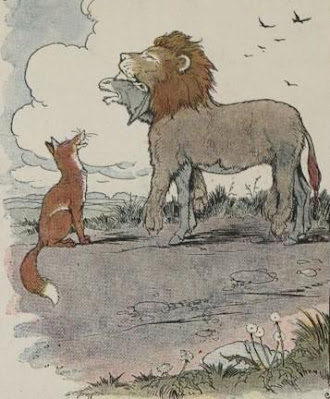Aesop's Fables, or the Aesopica, is a collection of fables credited to Aesop, a slave and storyteller believed to have lived in ancient Greece between 620 and 564 BCE. Of diverse origins, the stories associated with his name have descended to modern times through a number of sources and continue to be reinterpreted in different verbal registers and in popular as well as artistic media. The fables originally belonged to the oral tradition and were not collected for some three centuries after Aesop's death. By that time a variety of other stories, jokes and proverbs were being ascribed to him.
Fable:
The Ass in the Lion's Skin
An Ass found a Lion's skin left in the forest by a hunter. He dressed himself in it, and amused himself by hiding in a thicket and rushing out suddenly at the animals who passed that way. All took to their heels the moment they saw him.
The Ass was so pleased to see the animals running away from him, just as if he were King Lion himself, that he could not keep from expressing his delight by a loud, harsh bray. A Fox, who ran with the rest, stopped short as soon as he heard the voice. Approaching the Ass, he said with a laugh:
"If you had kept your mouth shut you might have frightened me, too. But you gave yourself away with that silly bray."
Moral:
A fool may deceive by his dress and appearance, but his words will soon show what he really is.
Alternatively:
It is not enough to pretend to be what you are. One must genuinely be what they say they are, otherwise, their true nature will start showing, and people will recognise their lie(s).
Clothes may disguise a fool, but his words will give him away.
By the way:
C. S. Lewis put the fable to use in The Last Battle, the final volume of The Chronicles of Narnia. A donkey named Puzzle is tricked into wearing a lion's skin, and then manipulated so as to deceive the simple-minded into believing that Aslan the lion has returned to Narnia. He then becomes a figurehead for a pseudo-government that works contrary to the interests of the Narnians.
Greek stamp, 1987







No comments:
Post a Comment
Note: Only a member of this blog may post a comment.